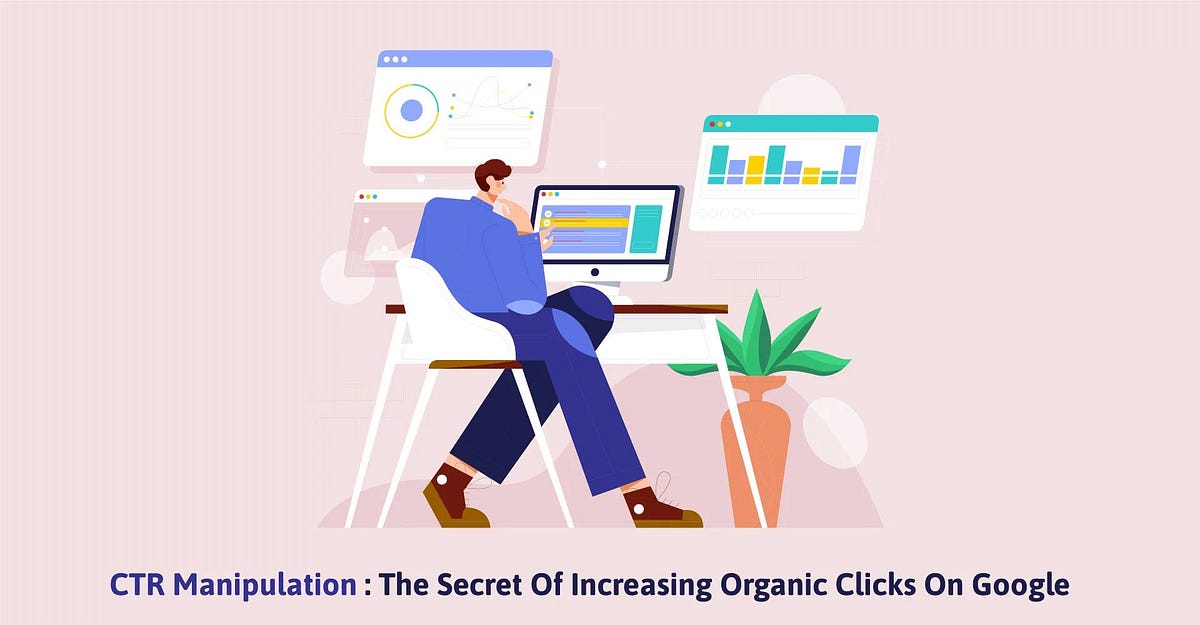Checking Out the Partnership Between CTR Control Providers and User Habits
In the realm of digital advertising and marketing, the influence of click-through rate (CTR) control solutions on user habits continues to be a complicated and fascinating topic. As on the internet platforms significantly rely upon CTR metrics to measure the success of web content, products, and solutions, comprehending just how these adjusted prices impact individual interaction and decision-making processes is vital. The interaction in between CTR manipulation and individual habits questions about authenticity, reliability, and the moral implications of such practices. By dissecting the complex partnership in between CTR adjustment services and individual habits, fascinating insights arise that may improve our understanding of digital advertising and marketing approaches and their effects on consumers.
Effect of CTR Manipulation on Behavior
Analyzing the influence of Click-Through Rate (CTR) adjustment on user habits discloses important understandings into the dynamics of online involvement. CTR control entails synthetically blowing up the number of clicks on a specific web link or advertisement to deceive customers and search engines. This method can bring about a distorted perception of a web page's popularity or significance, eventually impacting individual habits.

Moreover, CTR manipulation can skew the information used by algorithms to individualize individual experiences. This can cause users being served web content that does not straighten with their choices or interests, eventually bring about a decline in individual satisfaction and interaction. Understanding the effect of CTR adjustment on customer behavior is vital for keeping transparency and count on on the internet communications.
User Engagement With Controlled CTR
Individual involvement with adjusted CTR data commonly leads to skewed understandings of on the internet web content appeal and significance. When customers connect with material based on artificially inflated Click-Through Fees (CTR), they may think that specific details, items, or solutions are extra preferred or reliable than they in fact are. This can lead to individuals choosing based upon misleading data, causing potentially undesirable outcomes.
Engagement metrics like likes, shares, remarks, and time invested in a page are usually affected by CTR adjustment. Individuals may be much more inclined to involve with web content that shows up to have higher interaction rates, even more bolstering the cycle of manipulated assumptions. As an outcome, content creators and marketers might prioritize producing content that creates high CTR instead than focusing on developing really important and relevant product.

Mental Impacts of CTR Control

Moreover, the emotional impacts of CTR control can also show up in modified decision-making processes. Users might be much more inclined to click material solely based upon its viewed popularity, as opposed to its actual worth or significance to their needs. This behavior change can result in a surface interaction with online web content, where individuals might forget high-grade yet less preferred offerings for those with unnaturally improved CTRs.
Basically, the emotional ramifications of CTR control highlight the significance of keeping transparency and credibility in online communications to foster real user involvement and count on.
Moral Considerations in CTR Adjustment
CTR control increases worries regarding deceiving users, distorting data analytics, and compromising the integrity of on the internet material. By synthetically inflating CTR, users might be misdirected right into clicking on web links or ads they would not have actually selected otherwise, leading to an insincere online experience.
An additional honest element to contemplate is the justness of adjusting CTR to get an unjust advantage over rivals. Participating in such methods not only breaks principles of fair play yet likewise weakens the trust that users position in on the internet platforms. It is important for businesses and electronic marketers to promote honest standards in their techniques to guarantee openness, reputation, and long-lasting sustainability in the online setting.
Implications for Digital Advertising And Marketing
With the boosting reliance on electronic platforms for advertising and marketing purposes, the technique of manipulating click-through prices (CTR) positions substantial effects for the efficiency and honesty of digital advertising and marketing strategies. CTR adjustment can lead to manipulated information analytics, misinforming online marketers into thinking that their projects are doing better than they really are. This can cause misallocation of resources, with business purchasing click reference underperforming techniques based upon falsified CTRs. Moreover, when individuals understand that CTRs have actually been manipulated, it can wear down rely on the brand, causing lasting negative repercussions for client commitment and brand name credibility.
Additionally, the use of CTR control services can produce an unfair competitive landscape, where companies that take part in such techniques obtain an artificial advantage over those that stick to honest advertising requirements. This can stifle development and creativity in digital advertising and marketing, as success comes to be even more regarding control techniques than supplying real worth to useful reference consumers. Ultimately, the implications of CTR manipulation for digital marketing extend beyond short-term gains, influencing the total sustainability and trustworthiness of advertising initiatives in the digital realm.
Final Thought
In verdict, the connection in between CTR manipulation services and user behavior is complex and diverse. The impact of CTR control on actions, individual involvement with adjusted CTR, mental effects, ethical considerations, and ramifications for electronic marketing all contribute in shaping this connection. Understanding these dynamics is important for marketing professionals and researchers alike in order to browse the ethical ramifications and optimize the effectiveness of their electronic advertising and marketing methods.